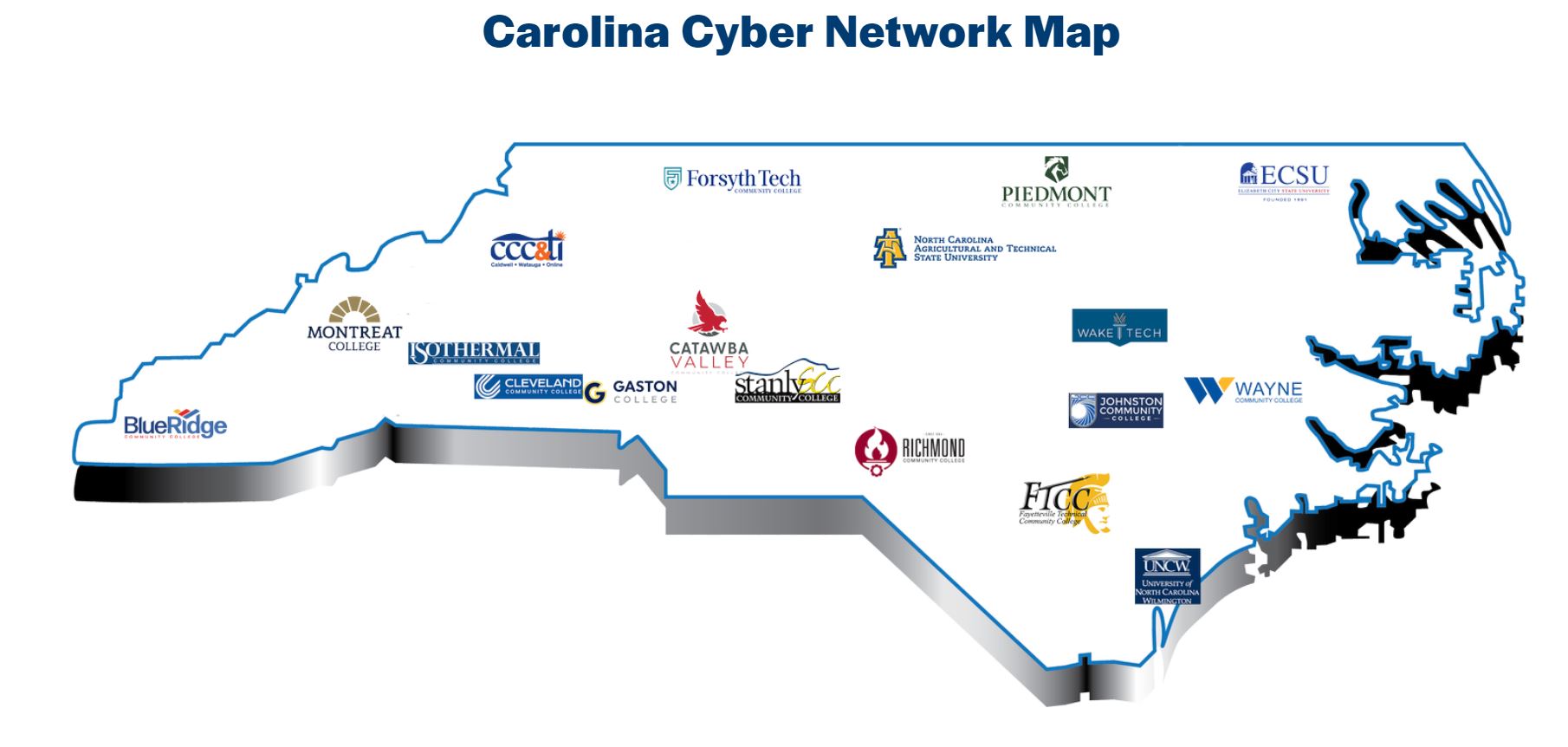
The Carolina Cyber Network (CCN) has taken a national leadership role in developing a high-functioning workforce ecosystem. Through working with the White House, the Office of the National Cyber Director and the National Security Council, as well as North Carolina’s congressional delegation, State Legislature and Governor’s office, the CCN has brought diverse stakeholders and multi-sector partners together to help provide experiential learning and exposure to career opportunities for nascent cyber professionals.
The Carolina Cyber Network (CCN) represents a collaborative effort among 18 colleges across North Carolina focused on closing the cybersecurity workforce gap and bolstering the state's security infrastructure. It stands as a pioneering public-private partnership, which fosters cooperation between industry, academia, and government in pursuit of a shared goal.

“An ecosystem helps create the foundation required for a wider-reaching and more sustainable solution to address the cyber skills gap. We are honored to be identified as an active ecosystem that is comprehensive in nature and holds promise in meeting the workforce needs in cybersecurity,” shared Fayetteville Technical Community College President Dr. Mark Sorrells, in a press release. FTCC is also credited as a founding member school of the CCN.
The CCN is honored to have supported the drafting of the National Cyber Workforce and Education Strategy and is highlighted as a national leader in active workforce ecosystems. The Office of the National Cyber Director (ONCD) within the White House released the National Cyber Workforce and Education Strategy (NCWES) on July 31, 2023. The document provides guidance for framing workforce strategies to address the nationwide shortage of cybersecurity professionals.
There are currently approximately over 21,000 open cybersecurity jobs in North Carolina alone, a number that broadens to 663,434 jobs nationally. Beyond the individual impact of lost career opportunities, the economic impact of under-protected communities can be catastrophic. One of the solutions proposed by the NCWES to address the skills gap is to provide opportunities for more Americans to pursue careers in cybersecurity by promoting accessible pathways through certificates, community college, and four-year degrees available across the country. A guiding imperative of the NCWES is leveraging best-in-class cyber education and workforce ecosystems like CCN to build a comprehensive system designed to train students through a high-quality pipeline for career opportunities in cybersecurity.
Beyond educational ecosystems, the NCWES aims to equip each citizen with foundational cybersecurity skills, provide cybersecurity education in every grade level, and strengthen the civilian and federal cybersecurity workforce. “With the release of ONCD’s strategy, we are excited to continue working within their framework, connecting our upcoming professionals to public and private employers and casting a vision for how quality cybersecurity professionals can create a more secure future for our nation,” says Executive Director of the Carolina Cyber Center, Larry Young in a press release.
Co-Executive Director of CCN and President of RBX Solutions, David Thompson stated in a press release: “There have been many efforts made throughout the country to create a holistic talent pipeline in cybersecurity. Although these have happened across a broad swath of colleges and universities, unfortunately they have not taken off for various reasons. The ONCD’s focus on bringing together a cohesive strategy and roadmap for cyber talent development has been sorely needed, and we are honored to have been asked to impart what we have learned through CCN’s successes to help make this important document a reality.”
Member institutions of CCN currently include: Blue Ridge Community College, Caldwell Community College and Technical Institute, Catawba Valley Community College, Cleveland Community College, Elizabeth City State University, Fayetteville Technical Community College, Forsyth Technical Community College, Gaston College, Isothermal Community College, Johnston Community College, Montreat College, North Carolina A&T State University, Piedmont Community College, Richmond Community College, Stanly Community College, University of North Carolina at Wilmington, Wake Technical Community College and Wayne Community College.

Kristen Botts co-founded the program with her husband, Nathan Botts, who is a Veteran himself. Photos provided by Kristen Botts.An organization helping Veterans live a full life after their service in the U.S. Military wants to connect Veterans and d

Patrick NoblesHuntington Bancshares Incorporated announced on Feb. 2 that it has closed its merger with Cadence Bank, a regional bank headquartered in Houston, Texas and Tupelo, Miss. This strategic partnership accelerates Huntington’s growth in

There is extensive dialogue surrounding Fayetteville as a travel destination or city aimed at recruiting new businesses and new residents. As someone who moved here from out of state, I thought it could be fun to share my personal experience as